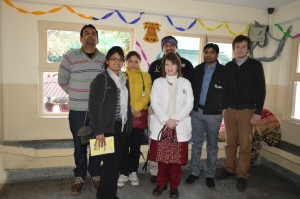While in my last blog I rather dryly went through “A day in the life of Lady Willingdon Hospital,” in this blog I am hoping to reflect on some of the difficulties of practicing medicine in rural India.
I must admit that up ‘til now I have had some difficulty in accepting Manali as a rural hospital, not because of the size of the area, but because it is so different to the New Zealand rural hospital that I am familiar with. After further considering this I came to the conclusion that the defining discrepancy is that Lady Willingdon Hospital (LWH) has an operating theatre and surgical staff.
In comparison, since the New Zealand government push for centralization of services in the late 20th century, these services have disappeared from many rural hospitals such as Balclutha where I was an RMIP student. From my observations here in Manali, I think that rural areas of New Zealand have lost a lot in this centralization – so far in Manali there have been many emergency caesarians, a ruptured appendixes that required emergency surgery and many broken bones reset in theatre.
Having appropriate facilities so close at hand meant that all were treated successfully and most recovered well. The benefits were not just limited to emergencies either – seeing the elective patient’s family during post-operative ward rounds made me wonder how many of them would be present to support the patient if they had to travel to a distant hospital, as the case may have been in New Zealand. Despite having an operating theatre, I still feel Manali is a rural hospital due to its isolated nature.
After having settled that Manali is in fact a rural hospital (in my own mind at least!), I wanted to gain a better understanding of the difficulties of practicing medicine in rural India. To do this I spoke to Dr Anna Alexander, LWH’s physician and Deputy Medical Superintendent. Prior to settling in Manali Dr Alexander worked in her native Louisiana, Ludhiana (an Indian city) and rural Kashmir, where many of her patients had never before seen a doctor.Initial changes in her practice involved adjusting to a different spectrum of diseases and delayed patient presentations – such as one of Dr Alexander’s patients who had been having pain from kidney stones for 20 years before coming to hospital.
Contributing to delayed patient presentations is the isolation of the Himalayas, both seasonal and permanent. While in cities like Ludhiana patients are up to 45 minutes away from a hospital, north of Manali the next hospital is two days’ travel away. Furthermore, much of the population is completely cut-off for six months of the year as the roads are covered by 40 to 60 feet of snow!
Another challenge of working in a rural area was adapting to medicine without the support of an extensive laboratory. Dr Alexander explained that not having an extensive laboratory makes achieving a diagnosis using history and examination much more important and she feels that her ability to achieve a clinical diagnosis has come far since arriving in rural India.
In her role as a deputy medical superintendent, Dr Alexander describes the greatest difficulty to be staffing the hospital – with regard to both nurses and doctors. One of the two main reasons for this is that the hospital can only afford to offer low salaries – the average consultant’s wage being less than the average house surgeon at other hospitals. The other reason is that it is difficult to keep staff for long periods.
To counteract this problem, LWH has established a fund to put locals through nursing training in the hope that they return home to Manali – similar to the medical rural entrance scheme in New Zealand. So far LWH’s efforts have been met with success and they now have a reliable stream of competent nurses.
My last question to Dr Alexander was “Why have you chosen to settle in a rural area?” When I heard her answer I can hardly say I was surprised – they were exactly the same reasons that I had enjoyed my year as an RMIP student in Balclutha. There is more continuity of care, the patient contact is more enjoyable at both a clinical and personal level and townsfolk have a tendency to embrace medical staff in the community. It seems some things are true of rural medicine everywhere.

1 Comment to 'Blog 3: Difficulties in practicing rural medicine in India by David Neynens'
August 16, 2014
Working in rural Hospital is really a pleasant expereince and I really appreciate the services these Doctors are providing this Village May God bless all of them
Leave a comment